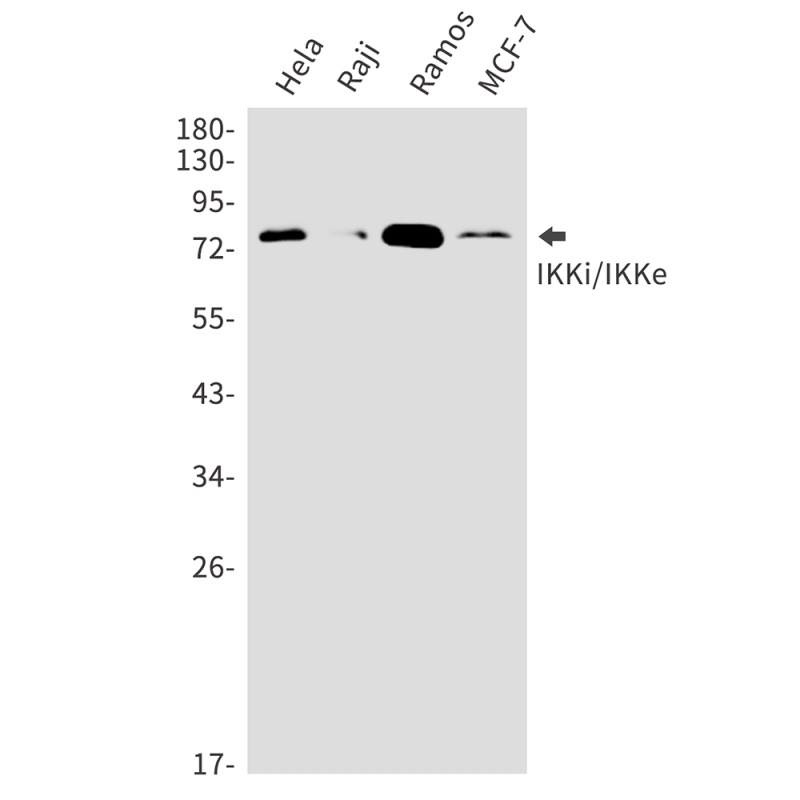
| WB | 1/500-1/1000 | Human,Mouse,Rat |
| IF | 咨询技术 | Human,Mouse,Rat |
| IHC | 1/50-1/100 | Human,Mouse,Rat |
| ICC | 1/50-1/200 | Human,Mouse,Rat |
| FCM | 1/50-1/100 | Human,Mouse,Rat |
| Elisa | 咨询技术 | Human,Mouse,Rat |
| Aliases | IKBKE; IKKE; IKKI; KIAA0151; Inhibitor of nuclear factor kappa-B kinase subunit epsilon; I-kappa-B kinase epsilon; IKK-E; IKK-epsilon; IkBKE; Inducible I kappa-B kinase; IKK-i |
| Entrez GeneID | 9641 |
| WB Predicted band size | Calculated MW: 80 kDa; Observed MW: 80 kDa |
| Host/Isotype | Rabbit IgG |
| Antibody Type | Primary antibody |
| Storage | Store at 4°C short term. Aliquot and store at -20°C long term. Avoid freeze/thaw cycles. |
| Species Reactivity | Human |
| Immunogen | A synthetic peptide of human IKKi/IKKe |
| Formulation | Purified antibody in TBS with 0.05% sodium azide,0.05%BSA and 50% glycerol. |
+ +
以下是3条与IKK epsilon(IKBKE)抗体相关的文献摘要概览:
1. **文献名称**: "IKKε and TBK1 are essential components of the IRF3 signaling pathway"
**作者**: Fitzgerald, K.A. et al.
**摘要**: 该研究揭示了IKKε和TBK1在病毒感染后通过磷酸化IRF3激活I型干扰素通路的关键作用,首次提出IKKε抗体可用于检测其在先天免疫信号中的定位及表达水平。
2. **文献名称**: "IKBKE is overexpressed in breast cancer and promotes malignancy via NF-κB activation"
**作者**: Boehm, J.S. et al.
**摘要**: 研究发现IKKε在乳腺癌中异常高表达,利用特异性抗体证实其通过激活NF-κB通路驱动肿瘤增殖和侵袭,提示其作为癌症治疗靶点的潜力。
3. **文献名称**: "Small-molecule inhibition of IKBKE attenuates pro-inflammatory cytokines in rheumatoid arthritis"
**作者**: Clark, K. et al.
**摘要**: 该文献通过IKKε抗体验证了其在小分子抑制剂筛选中的作用,证明阻断IKKε活性可显著降低类风湿性关节炎模型中的炎症因子释放,为药物开发提供依据。
*注:以上内容为简化概括,实际文献需通过PubMed或学术数据库检索原文。*
The IKK epsilon (IKBKE) antibody is a crucial tool in studying the IKK-related kinase family, which plays pivotal roles in innate immunity and inflammatory signaling. IKK epsilon, along with TBK1. regulates key pathways like the NF-κB and IRF3/7 cascades, which are activated by pathogen-associated molecular patterns (PAMPs) or cytokines. Unlike canonical IKKs (IKKα/β/γ), IKK epsilon is not part of the NF-κB core complex but contributes to antiviral responses, cell survival, and oncogenesis. Dysregulation of IKK epsilon is linked to cancers (e.g., breast, ovarian), autoimmune disorders, and metabolic diseases.
IKK epsilon antibodies are designed to detect and quantify the kinase in experimental models, enabling research into its function, phosphorylation events, and interactions. These antibodies are validated for specificity in techniques like Western blotting, immunoprecipitation, and immunofluorescence. Monoclonal and polyclonal variants offer flexibility depending on assay requirements. Recent studies highlight IKK epsilon's role in tumor microenvironments and resistance to therapies, making its antibody a valuable reagent for mechanistic and therapeutic investigations. By targeting IKK epsilon, researchers aim to unravel its signaling networks and explore potential inhibitors for disease modulation.
×